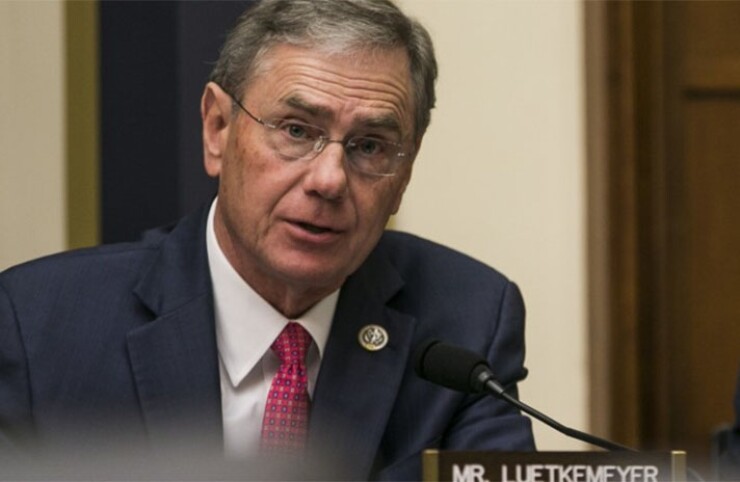The chairman of the Financial Accounting Standards Board received a chilly reception from a key House subcommittee, providing hope that lawmakers will eventually put a controversial accounting standard for loan losses on ice.
Lawmakers blasted Russell Golden and FASB, the independent board charged with setting accounting standards, repeatedly during Wednesday's hearing for implementing the Current Expected Credit Loss standard without conducting an economic impact study.
CECL is viewed by many industry observers as a sea change for banks, credit unions and other lenders because it requires them to estimate and reserve for credit losses when a loan is booked, rather than waiting for signs of deterioration. The standard took effect on Jan. 1 for large, publicly traded banks. Smaller banks and credit unions have another three years until their scheduled conversion date.

The crux of the Subcommittee on Investor Protection, Entrepreneurship and Capital Markets hearing was whether FASB adequately considered CECL's likely impact on bank capital lending and the economy.
Golden told lawmakers FASB “did a cost-benefit analysis in connection with our mission, which is to provide better, more decision-useful information to the capital markets and other users, including regulators.” He argued further that the standard would provide better data on credit quality for investors and regulators.
“We think the information provided to investors is consistent with how they analyze financial institutions," Golden said. "They’ll be able to make more-informed decisions that will help our capital markets, and we think that’s a good thing. We also think the banking regulators will have better and more refined information … and we think that is a good thing, as well.”
Democratic and Republican members of the subcommittee made it clear that they thought FASB should have studied CECL’s effect on factors such as lending and consumer access to credit before approving the new standard.
“A simple accounting standard is going to decimate the people in my district’s ability to have home mortgages,” said Rep. Blaine Luetkemeyer, R-Mo. "This has got to stop. This can’t continue. You should stop and look at the damage you’re going to be doing to the citizens of this country. And in essence after that happens, it’s going to devastate our economy. ... And without a study, you can’t prove me wrong.”
Rep. Ann Wagner, R-Mo., twice asserted that proceeded without an economic impact study was a "stunning" decision.
“A new accounting standard that affects the economy this much should have significant studies backing it,” she added.
CECL “is going to affect banks’ capital retention in a way accountants and regulators cannot predict,” Rep. Vincente Gonzalez, D-Texas, said. “Less capital means fewer small loans. … We have a problem in our country getting mortgages under $100,000. My concern is that CECL is bound to make that problem even worse.”
Minority banks and credit unions have been expressing their concerns to Rep. Gregory Meeks, D-N.Y.
“If these financial institutions curb lending and restrict credit, low-income individuals could see their cost of borrowing rise, or lose access to credit altogether," Meeks added. “With a major shift like this, let’s make sure. Let’s dot our i’s and cross our t’s."
Golden received a mocking response from Rep. Brad Sherman, D-Calif., when the FASB chairman noted in response to Meeks that smaller banks, including minority depository institutions, will have time to review and study how bigger banks implement CECL before their January 2023 deadline.
“I’m sure the gentleman is gratified that the impact on low- and moderate-income families and families of color will be delayed to some degree until 2023, by which time I’m sure [they] won’t have any problems,” said Sherman, the subcommittee’s chairman.
Banks that have reported fourth-quarter 2019 earnings to date indicate that CECL’s effect on loan-loss reserves and capital has been relatively manageable.
Michael Roffler, chief financial officer at First Republic Bank in San Francisco, said during a conference call Tuesday that reserves at his $116 billion-asset bank, which totaled $496.1 million on Dec. 31, would increase by about 5% due to CECL.
JPMorgan Chase estimated that CECL would result in a $4.3 billion increase to its $14.3 billion loan-loss allowance. U.S. Bancorp predicted its CECL impact would be $1.5 billion.
As part of the budget deal passed last month, Congress directed the Treasury Department to study CECL's potential negative impact on bank regulatory capital. A FASB spokesman said Thursday that the board has not yet been contacted in connection with the study.
While the spokesman declined to comment on Wednesday’s hearing, Golden said lawmakers' concerns are definitely on his radar.
"This hearing, the results, you have my attention."





